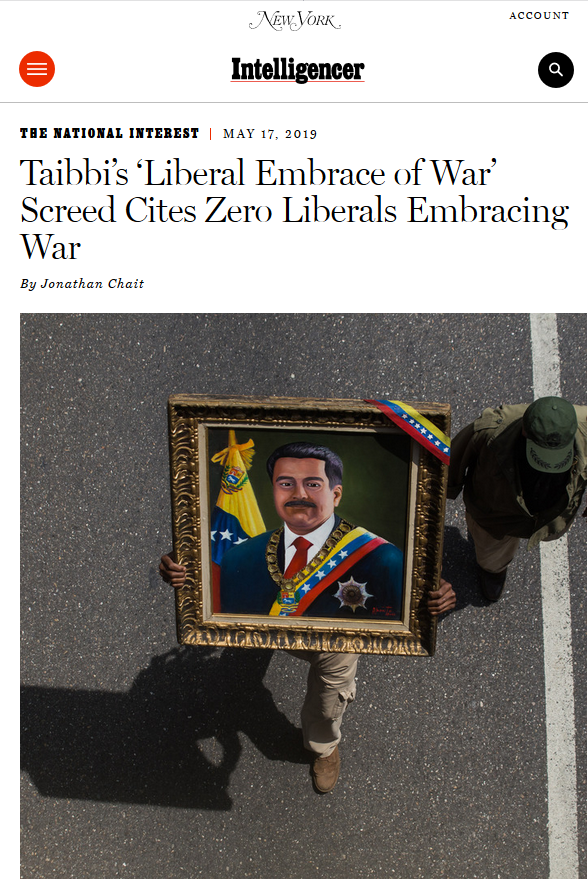 |
Why Jon Chait Can’t Read
view post on FAIR.org
by Jim Naureckas

Just as an aside, Jonathan Chait’s critique (New York, 5/17/19) of Matt Taibbi is directed almost entirely at the headline of Taibbi’s piece (Rolling Stone, 5/16/19), which as I’m sure Chait is well aware was most likely not written by Taibbi.
New York’s Jonathan Chait (5/17/19) wrote a column attacking Matt Taibbi’s Rolling Stone piece (5/16/19), “The Liberal Embrace of War.” “I have read Taibbi’s story carefully,” Chait assures us—which is good to hear, because based on his treatment of a FAIR study that he discusses as one of Taibbi’s sources, I wouldn’t think he was a very careful reader at all.
Here’s how Chait describes the study—which you can read for yourself on FAIR.org (4/30/19):
The method of the FAIR study is to analyze a selection of commentary on the subject of Venezuela. Every piece that describes Maduro as a strongman or authoritarian is categorized as endorsing “regime change.”
Actually, as study author Teddy Ostrow said, we categorized commentary as endorsing regime change if it “expressed explicit support for the Maduro administration’s ouster.” Seventy-two percent of commentary fell into that category. Contrariwise, we would have categorized commentary as opposing regime change if it explicitly opposed Maduro’s removal—but we didn’t find any commentary that did that.
Chait calls this an “absurdly lax standard”—counting pundits as being pro–regime change if they endorse regime change. He seems especially dismayed that “FAIR’s ‘pro–regime change’ bin” included a piece by Rep. Ro Khanna (Washington Post, 1/30/19), which he claims is there because
it contains a “to be sure” sentence criticizing the regime—“To be sure, Maduro is an authoritarian leader who has presided over unfair elections, failed economic policies, extrajudicial killings by police, food shortages and cronyism with military leaders.”
That passage—which was not quoted by FAIR—was not why we categorized Khanna’s piece as pro–regime change. The passage we did quote was:
The United States should lend its support to diplomatic efforts to find some form of power-sharing agreement between opposition parties, and only until fair elections can take place, so that there is an orderly transition of power.
So we categorized him as pro–regime change, because he wrote that he supports “an orderly transition of power”—in other words, regime change.
Chait is critiquing an imaginary study by FAIR that judged media on whether they “describe[d] Maduro as a strongman or authoritarian.” His problem with this imaginary study “is that Maduro is considered an authoritarian by the entire human rights community.” In other words, FAIR (and Taibbi) are complaining that commentary is one-sided—but commentary should be one-sided. Why would anyone disagree with “the entire human rights community”?
In reality, of course, there is more to the human rights community than Chait imagines. There’s a statement, for example, signed by 70 Latin American scholars and humanitarian activists condemning “US support for an opposition strategy aimed at removing the government of Nicolás Maduro through extra-electoral means”—signed by leaders of such groups as the Alliance for Global Justice, the Center for International Policy, Code Pink , the Center for Economic and Policy Research, the Institute for Policy Studies, the Tricontinental Institute for Social Research and Toward Freedom .
Would Chait disagree with these human rights advocates’ take on Venezuela? Probably—if he had ever seen it. But because he shares the approach of elite media decision-makers—if I disagree with it, there’s no need for it to be heard—he’s very likely unaware of the arguments they make, and certainly has had no real need to ever engage with those arguments.
That’s why, when he is moved to “carefully” respond to a fellow journalist’s critique of their mutual profession, the best he can offer is a caricature of that colleague’s sources. Jonathan Chait doesn’t know how to read critically because agreeing with everyone who matters means you never have to.
You can send a message to New York at comments@nymag.com (Twitter:@NYMag). Please remember that respectful communication is the most effective.
Featured image: Photo illustrating from Venezuela illustrating Matt Taibbi’s Rolling Stone piece (5/16/19).
|
|
FAIR/Fairness & Accuracy In Reporting
124 W. 30th Street, Suite 201
New York NY 10001
USA
Comments
Post a Comment